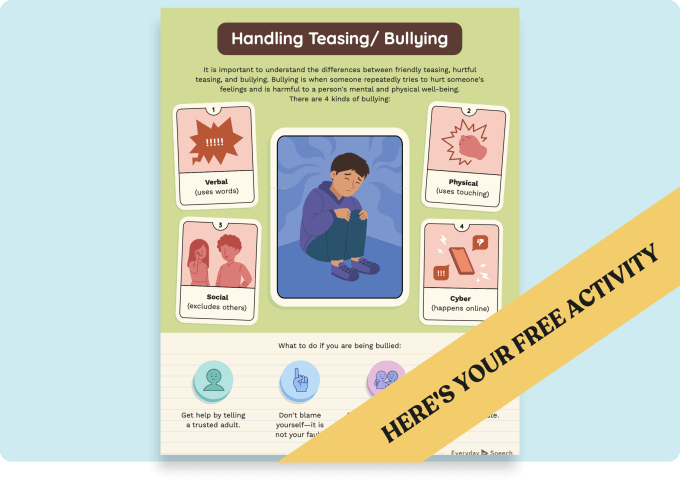Effective IEP Goals for Developing Sarcasm Recognition in Middle School Students
Get free social skills materials
No-prep lessons on self-regulation, emotional recognition, conversation skills, and more.
Sign up hereDownload 50+ Example IEP Goals
Customizable library of strengths-based goals
Introduction
In special education, developing a range of social communication skills is essential for students to succeed academically and socially. One such skill, often overlooked, is the ability to recognize and understand sarcasm. This blog post will explore the importance of sarcasm recognition in middle school students and provide actionable IEP goals for educators.
Understanding Sarcasm Recognition
Sarcasm recognition is the ability to identify when someone is using sarcasm – saying the opposite of what they mean to be funny or make a point. This skill plays a crucial role in students’ learning, social interactions, and wellbeing, as misunderstandings can lead to confusion and negative feelings. By developing sarcasm recognition, students can better navigate social situations and maintain positive relationships with their peers.
The Role of Specialists
Various specialists can support the development of sarcasm recognition in students. Speech-Language Pathologists can help students understand the nuances of tone and vocal inflections associated with sarcasm. Social Workers can assist students in applying sarcasm recognition to real-life situations and provide guidance on appropriate responses. Psychologists can help students explore the emotional aspects of sarcasm and develop coping strategies for misunderstandings. Finally, School Counselors can support students in building relationships and fostering positive peer interactions.
IEP Goals for Sarcasm Recognition
Below are SMART IEP goals to improve sarcasm recognition in middle school students, along with suggested strategies and activities for implementing these goals.
- Goal: The student will accurately identify sarcasm in a conversation with 80% accuracy across three consecutive sessions.
Strategies/Activities: Role-play conversations, analyze video clips, use social stories to practice sarcasm recognition.
- Goal: The student will respond appropriately to sarcastic statements in social situations with 75% accuracy over four weeks.
Strategies/Activities: Practice responding to sarcastic comments, discuss appropriate reactions, and develop a list of response options.
- Goal: The student will demonstrate understanding of the speaker’s intent when using sarcasm in 8 out of 10 instances over a six-week period.
Strategies/Activities: Teach students to analyze context cues, use visual aids, and engage in group discussions about sarcasm.
Implementing and Measuring Progress
To implement these IEP goals, educators should collaborate with specialists, provide ample opportunities for practice, and offer consistent feedback. Measuring progress can be achieved through data collection, such as tracking students’ accuracy in identifying sarcasm, observing their responses in social situations, and assessing their understanding of the speaker’s intent.
Conclusion
Developing sarcasm recognition is crucial for middle school students to thrive in social interactions. By implementing effective IEP goals and collaborating with specialists, educators can help students improve this vital skill. Remember to measure progress and provide feedback to ensure success. We encourage you to apply these IEP goals and invite your feedback on their effectiveness.
CTA: To explore more resources on social communication skills, check out the Everyday Speech Sample Materials.


